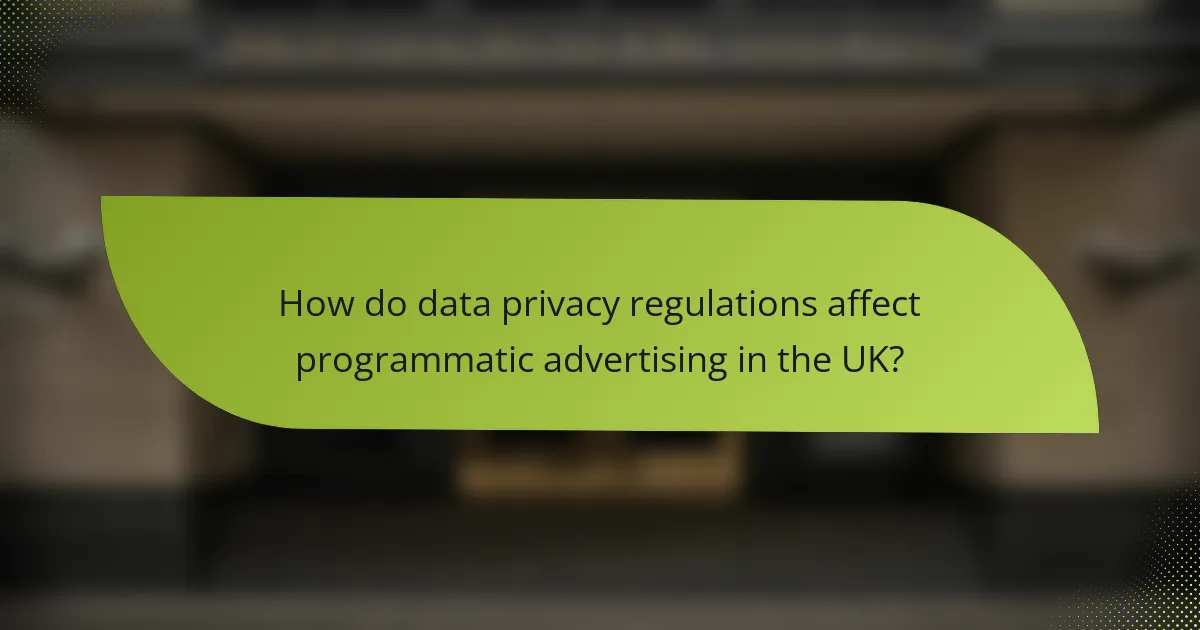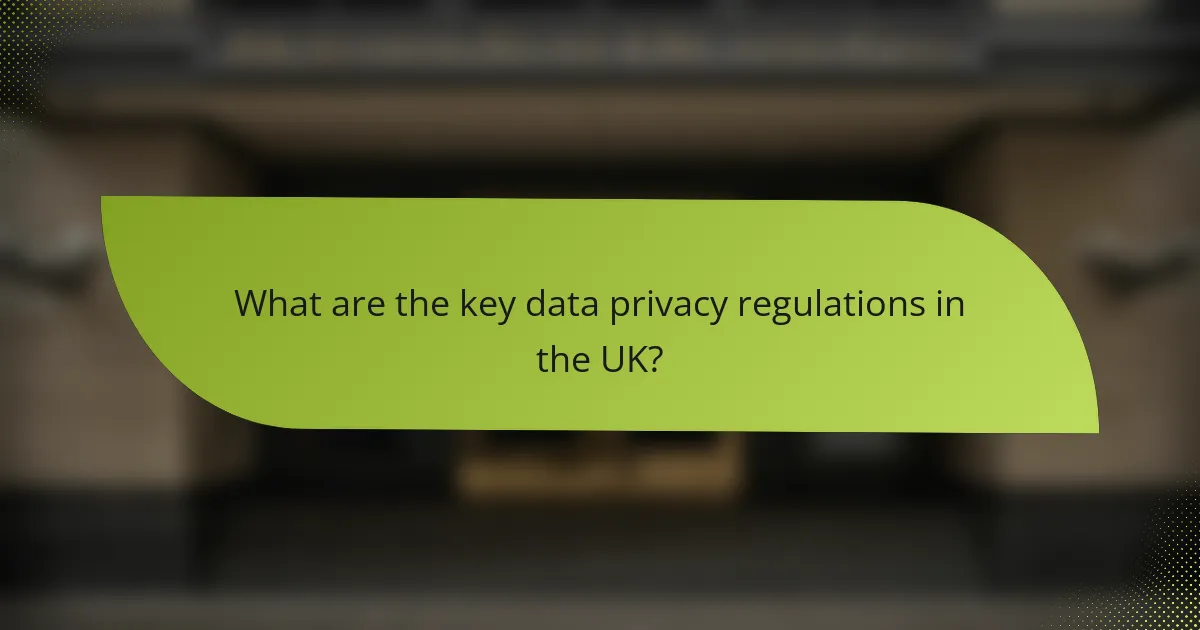Data privacy regulations in the UK play a crucial role in shaping programmatic advertising by enforcing strict guidelines on the collection and use of personal data. Key regulations such as the GDPR and the UK Data Protection Act 2018 require advertisers to prioritize transparency and user consent, making compliance essential for maintaining consumer trust and avoiding penalties.

How do data privacy regulations affect programmatic advertising in the UK?
Data privacy regulations significantly impact programmatic advertising in the UK by imposing strict rules on how personal data can be collected, processed, and used. Compliance with these regulations is essential for advertisers and publishers to avoid hefty fines and maintain consumer trust.
Impact of GDPR on data usage
The General Data Protection Regulation (GDPR) has transformed data usage in programmatic advertising by requiring explicit consent from users before their data can be processed. Advertisers must ensure that they have a clear and transparent consent mechanism in place, which can complicate data collection efforts.
Additionally, GDPR mandates that users have the right to access their data and request its deletion. This means advertisers must implement systems to manage data requests efficiently, which can increase operational costs and complexity.
Effects of the UK Data Protection Act
The UK Data Protection Act complements GDPR and enforces similar principles regarding data privacy. It emphasizes the importance of data minimization, meaning advertisers should only collect data that is necessary for their specific purposes.
Moreover, the Act requires organizations to appoint a Data Protection Officer (DPO) if they handle large volumes of personal data. This adds another layer of responsibility and oversight for businesses engaged in programmatic advertising.
Consequences for advertisers and publishers
Advertisers and publishers face significant consequences if they fail to comply with data privacy regulations. Non-compliance can result in substantial fines, potentially reaching millions of pounds, depending on the severity of the violation.
Furthermore, the need for compliance may lead to reduced data availability, limiting the effectiveness of targeted advertising campaigns. Advertisers should focus on building trust with consumers through transparent data practices to mitigate these risks and enhance their brand reputation.

What are the key data privacy regulations in the UK?
The key data privacy regulations in the UK include the General Data Protection Regulation (GDPR), the UK Data Protection Act 2018, and the Privacy and Electronic Communications Regulations (PECR). These regulations govern how personal data is collected, processed, and stored, significantly impacting programmatic advertising practices.
General Data Protection Regulation (GDPR)
The GDPR is a comprehensive data protection law that applies to all EU member states and has been retained in UK law post-Brexit. It mandates that organizations obtain explicit consent from individuals before processing their personal data, which includes data used in programmatic advertising.
Advertisers must ensure transparency about how data is collected and used, providing clear information to users. Non-compliance can result in hefty fines, potentially reaching millions of euros or a percentage of annual global turnover.
UK Data Protection Act 2018
The UK Data Protection Act 2018 complements the GDPR by providing specific provisions for data processing within the UK. It establishes the Information Commissioner’s Office (ICO) as the regulatory authority overseeing data protection compliance.
This act includes additional rules for processing special categories of data, such as health information, which may be relevant for targeted advertising. Organizations must implement robust data protection measures and maintain records of processing activities to comply with this law.
Privacy and Electronic Communications Regulations (PECR)
The PECR specifically addresses privacy rights in electronic communications, including rules on cookies and direct marketing. It requires that users give consent before cookies are placed on their devices, impacting how advertisers track user behavior online.
Programmatic advertisers should be aware of the need to inform users about cookie usage and provide options to opt-out. Failure to comply with PECR can lead to enforcement actions by the ICO, including fines and restrictions on advertising practices.

What compliance strategies should advertisers adopt?
Advertisers should adopt compliance strategies that prioritize transparency, user consent, and data protection to align with UK data privacy regulations. Key approaches include implementing consent management platforms, utilizing data anonymization techniques, and conducting regular compliance audits.
Implementing consent management platforms
Consent management platforms (CMPs) help advertisers obtain and manage user consent for data collection and processing. These tools ensure compliance with regulations like the UK GDPR by providing clear options for users to opt in or out of data tracking.
When selecting a CMP, consider its integration capabilities with existing marketing tools and its user interface. A user-friendly CMP can significantly enhance user experience and improve consent rates.
Data anonymization techniques
Data anonymization techniques involve modifying personal data so that individuals cannot be identified, thus reducing privacy risks. Techniques such as data masking, aggregation, and pseudonymization are commonly used in programmatic advertising to protect user identities.
Implementing these techniques can help advertisers leverage data for targeted advertising while minimizing compliance risks. However, it’s crucial to balance data utility with privacy, ensuring that anonymized data remains useful for analysis without compromising individual privacy.
Regular compliance audits
Conducting regular compliance audits is essential for ensuring that advertising practices align with data privacy regulations. These audits should assess data handling processes, consent management, and overall adherence to legal requirements.
Establish a routine schedule for audits, ideally quarterly or bi-annually, to identify potential compliance gaps. Document findings and implement corrective actions promptly to maintain compliance and build trust with users.

How can advertisers ensure transparency with users?
Advertisers can ensure transparency with users by clearly communicating how their data is collected, used, and shared. This involves providing accessible information and obtaining informed consent from users regarding their data practices.
Clear privacy policies
Clear privacy policies are essential for building trust with users. These documents should outline what data is collected, the purpose of the collection, and how the data will be used or shared. Policies should be written in plain language to ensure users can easily understand them.
Advertisers should regularly review and update their privacy policies to reflect any changes in data practices or regulations. This helps maintain compliance with the UK’s Data Protection Act and the General Data Protection Regulation (GDPR).
User-friendly consent forms
User-friendly consent forms are crucial for obtaining explicit permission from users before collecting their data. These forms should be straightforward, allowing users to easily understand what they are consenting to and providing options to accept or decline specific data uses.
Consider using layered consent forms that provide a brief overview with the option to read more detailed information. This approach respects user preferences and enhances transparency, making it easier for users to make informed decisions about their data.

What are the penalties for non-compliance?
Penalties for non-compliance with data privacy regulations in the UK can be severe, including substantial fines and reputational harm. Organizations that fail to adhere to these regulations risk facing financial penalties and damage to their brand image.
Fines under GDPR
Under the General Data Protection Regulation (GDPR), fines for non-compliance can reach up to €20 million or 4% of a company’s global annual revenue, whichever is higher. This tiered approach means that the severity of the violation influences the penalty amount, with more serious breaches attracting larger fines.
For example, a company with a global revenue of €500 million could face fines of up to €20 million for serious violations. It is crucial for businesses to implement robust data protection measures to mitigate the risk of such penalties.
Reputational damage
Non-compliance can lead to significant reputational damage, which may have long-lasting effects on a company’s market position. Customers are increasingly aware of data privacy issues and may choose to avoid businesses that do not prioritize their data protection.
In addition to losing customer trust, companies may face negative media coverage and scrutiny from regulators, further compounding the damage. To protect their reputation, organizations should prioritize compliance and transparency in their data handling practices.

What role do third-party vendors play in compliance?
Third-party vendors are crucial in ensuring compliance with data privacy regulations in programmatic advertising. They manage data collection, processing, and storage, which directly impacts how businesses adhere to laws like the UK GDPR.
Vendor risk assessments
Conducting vendor risk assessments is essential for identifying potential compliance issues with third-party vendors. This process involves evaluating vendors based on their data handling practices, security measures, and compliance history. Regular assessments help mitigate risks associated with data breaches or non-compliance.
Consider creating a checklist that includes criteria such as data encryption, access controls, and incident response plans. This will streamline the evaluation process and ensure that all critical areas are covered.
Choosing compliant advertising platforms
Selecting compliant advertising platforms is vital for maintaining data privacy standards. Look for platforms that provide transparent data usage policies and demonstrate adherence to regulations like the UK GDPR. This includes obtaining explicit consent from users before data collection.
When evaluating platforms, prioritize those that offer features such as user data anonymization and robust opt-out mechanisms. Additionally, check for certifications or audits that confirm their compliance status, which can provide added assurance in your vendor selection process.

What are the emerging trends in data privacy and advertising?
Emerging trends in data privacy and advertising focus on stricter regulations and increased consumer awareness. As privacy laws evolve, advertisers must adapt their strategies to comply while maintaining effective targeting.
Increased Regulation and Compliance Requirements
Regulatory frameworks like the UK General Data Protection Regulation (GDPR) impose stringent requirements on how data is collected, stored, and used. Advertisers must ensure that they have explicit consent from users before processing their personal data.
Compliance involves regular audits and updates to data handling practices. Businesses may need to invest in legal consultations and training for their teams to stay informed about changes in regulations.
Shift Towards First-Party Data
With third-party cookies being phased out, there is a significant shift towards leveraging first-party data. This type of data, collected directly from users through interactions on a brand’s website or app, is seen as more reliable and compliant with privacy laws.
Brands can enhance their first-party data strategies by encouraging user sign-ups, offering personalized experiences, and utilizing loyalty programs. This approach not only builds trust but also improves targeting accuracy.
Consumer Awareness and Expectations
Consumers are becoming increasingly aware of their data privacy rights and expect transparency from advertisers. This trend is driving brands to adopt more ethical data practices and clearly communicate their data usage policies.
To meet these expectations, companies should provide easy-to-understand privacy notices and allow users to manage their data preferences. Engaging consumers in conversations about privacy can enhance brand loyalty and trust.



